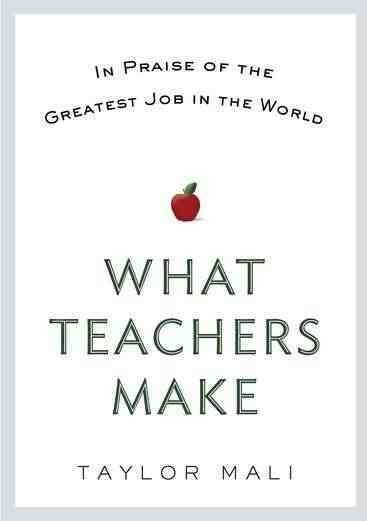I am a reader and book evangelist. For many years I have kept a reading journal with little descriptions of the books I read and dates I read them. Kind of a trail of book bread crumbs that chart my interests over a given course of time. This blog gives me a way to continue my journal and share my reading interests with others. My latest adventures in creating, dining, and traveling can be found at my website LindasOtherLife.com
Saturday, March 02, 2013
What Teachers Make - In Praise of the Greatest Profession in the World
Taylor Mali is a teacher advocate and performance poet famous for a poem he wrote called "What Teachers Make". The poem - and video that by now all my teaching friends have seen - grew into a crusade and now an inspiring book about the intrinsic rewards of teaching.
The poem began as a response to a lawyer who insulted Mali and the entire teaching profession at a dinner party in 1997. In the introduction to the book, Mali explains - "For the lawyer, it really came down to how poorly compensated teachers are — no intelligent person would take a job that paid less than what he was making as a lawyer. At the party that night I was so furious inside that I couldn't come up with a clever comeback, so I bit my tongue and laughed politely. But the next day, January 1, 1998, I wrote a poem that was the forceful response I wish I had delivered that night. The poem was called "What Teachers Make."
Last year, when I heard Mali had written a book expanding the sentiments of this poem, I preordered it and read it cover to cover when it arrived. I wanted to wave it in the face of every co-worker I knew who needed encouragement. In the suburban school district where I taught high school English for 30 years, the last several have been really difficult for teachers. Mali sounds a battle cry for continued professionalism in a doubting age with chapter titles including "Making Kids Work Hard", "Your Child is My Student", and "Lightbulb Moments and Happy Accidents". These chapters elaborate on the tough work teachers do and how difficult it is to continue to be rigorous with children in a society that has become lazy. One where parents are micro-managing the school lives of their children, but have no idea what they are really doing with the cell phones they have given them. The happy accidents Mali refers to occur most often when effective teaching influences the desire for life-long learning by providing students with relevant assignments, alternative assessments, risk-rewarding learning environments, and engagement with the narrative of the learner’s life.
Mali also has a chapter called "Fighting Back Against the Attack on Teachers". In it he recognizes the greed and excess that permeates so much of society. He understands that "Profit in the short term has come to trump sustainable and equitable long term growth," and acknowledges this voracious machine has finally set its sight on teachers. What he does not understand - and frankly neither do we who have devoted our lives to teaching - is the recent characterization of teachers as lazy and greedy. He writes, "Only someone with very little understanding of what teaching requires would say such a thing." He suggests putting anyone who doubts the commitment it takes to succeed into a classroom for a year. He finally illuminates the truth - "All of the teachers I have known need one hour outside the classroom for every hour they spend in the classroom. So next time you hear someone talk about the paltry number of hours teachers put in every day, double it." He also discusses teacher burn out and cites the statistic that fifty percent of teachers quit by the fifth year of teaching. It is just too much work for too little pay.
I love this book. I was reminded of it this week when a guidance counsellor friend posted the video on her Facebook page (thank you, Tara). Last year before my husband, English department chair, and I retired, we entertained the thought of buying one for everyone in our department to take out and read on dark weekends like this one. Instead we played the video at our last department meeting and entrusted one copy to the department library.
Today, I would place this book in the lap of every one of my friends in the profession as a reminder of why you were called to teaching in the first place. The greatest profession in the world has never been great because of what you make. You are worth so, so, so much more.
Subscribe to:
Post Comments (Atom)

2 comments:
Brilliant blog, thank you very much. It seems very well written and I have taken my time to read it thoroughly.
Best Essay Writing Services
|||
Custom Essay Writing Professional USA
I love it what you post! becauz i like your writing style!
Technology Writing Services Online
Post a Comment